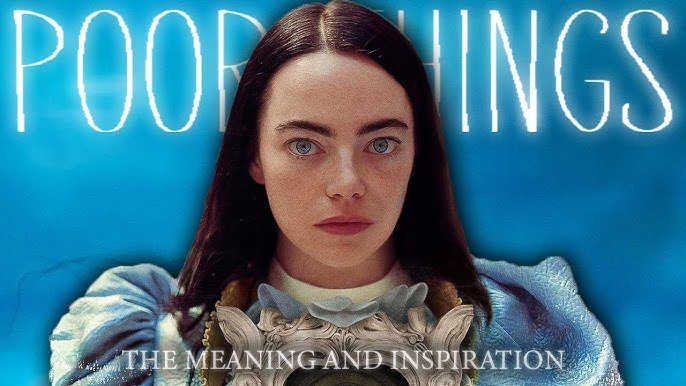
Poor Things
It seems that Yorgos Lanthimos likes to show the abnormal in the normal, whether it’s in “Dogtooth”’s suburban home or “The Lobster”’s medical office or “The Favourite”’s palace. The contrast between how we should act and what we really are appears to be a source of endless intrigue for him.
Nowhere is this dichotomy more heightened and entertaining than in his latest film, and his best one yet, “Poor Things.” It’s all delightfully strange: the acting, the dialogue, the costumes, the sets. But at its heart as with many of this Greek director’s films “Poor Things” is about wanting a true human connection even though it can be awkward. We want to know who people are; we want them to see us. Bella Baxter, at the center of this movie, aims for enlightenment: she wants to become herself and find that self mirrored in others who love her without ulterior motives. You’ve heard versions of this story before a young woman goes on a quest and realizes she had what she wanted all along but never like this.
It’s Victorian London and Emma Stone’s Bella lives in an elegant townhouse with her father figure/mad scientist Dr. Godwin Baxter (Willem Dafoe). Beneath his scarred face he offers delightfully gentle company. Bella is an adult woman who acts like an infantile toddler: grunting words instead of speaking them, throwing plates on the floor when something displeases her then spinning around stiff-legged with glee for no apparent reason. She calls him God because well, I’ll let you discover that part for yourself.
Godwin is one of several men who try to shape Bella over the course of her life; another is his student Max McCandles (Ramy Youssef). Max moves in to help with Godwin’s research but ends up falling in love with Bella and proposing marriage, and Youssef injects warmth and sanity into this otherwise madcap world. But he’s no match for Mark Ruffalo as obvious cad Duncan Wedderburn, who sweeps her off her feet and takes her on a whirlwind trip around the world. (Mostly this involves vigorous sex in many positions which Bella refers to as “furious jumping” in her rapidly developing mind; it is crucial both to her independence and the movie’s brash sense of humor.)
Working with Lanthimos again after “The Favourite,” Stone delivers the performance of a lifetime in a role that requires an impossible amount of range. This could have gone so wrong; instead, what she’s doing here is vibrantly alive and full of surprises both big and small. Watching her start out broad and get more specific physically and verbally fine tuning Bella as she goes along is a marvel. She’s doing such technically precise comic work while still tapping into something deeply primal about being a child, but then she also becomes riveting when she’s fully empowered sexually as an adult woman. We fall for her hard early on despite her being such an insolent brat much of the time, and we keep rooting for her even as the forces of patriarchal oppression gather against her.
Ruffalo, on the other hand, is extremely amusing in a way you haven’t seen him before. He’s equally a magnetic Romeo and an arrogant idiot. He’s also suddenly hot, and later on, charmingly pitiful. Also among the star-studded supporting cast are comedian Jerrod Carmichael and German legend Hanna Schygulla as fellow travelers who provide Bella with a push toward self-possession. A clever bit involving a book on a cruise ship is especially hilarious. The petite but mighty Kathryn Hunter, so haunting recently as one of the Witches in Joel Coen’s “The Tragedy of Macbeth,” delivers a spicy, spiky turn as a Paris madame but even that small role has shading you don’t anticipate at first.
“Poor Things” is so much fun because of how specific it is about language. Tony McNamara’s screenplay (based on Alasdair Gray’s novel) begins in deliberately fragmented and stilted fits and starts but there’s a rhythmic poetry to it. The dialogue gets more florid as Bella blooms intellectually, and it’s glorious to see Stone wrap her mouth around the complexity of her pronouncements. McNamara isn’t quite as deliciously nasty here as he was in Lanthimos’ “The Favourite,” but his writing bounces along with its own witty bite.
Robbie Ryan’s cinematography creates the grandeur of this world in stunningly beautiful textures and hues. “Poor Things” starts out grainy black-and-white when Bella is more childlike, full of fish eye lenses and peepholes to keep us off balance but draw us closer in curiosity; then it expands into lush, vibrant color as Bella comes into her own the nighttime skies during the ocean voyage portion of her journey are particularly awe inspiring. This evolution may sound obvious but it feels like a magic trick he’s pulled off right before our eyes.
Holly Waddington’s costume design tells Bella’s story convincingly in detailed, vibrant ways. Simple white nightgowns in her girlish state give way to puffed-sleeve explosions, each one more elaborate than the last. And where to begin singing the praises of Shona Heath and James Price’s production design? From Godwin’s slightly off kilter house to a luxurious Lisbon hotel to a cramped Parisian brothel, each new setting reimagines the kinds of historical images we might think we know only through an outlandish prism with hints of Escher and Gaudi.
All these exquisite technical elements would be meaningless if we didn’t care about the woman at the center of them. But we do. Bella remains sweet and hopeful even as she sees the truth of the outside world, but she’s also learned enough to flex her newfound power when necessary. It’s like if “Barbie” were actually about Weird Barbie but that doesn’t quite capture it either. The best way to put it is: It’s the best movie of the year.
For More Movies Visit Putlocker.